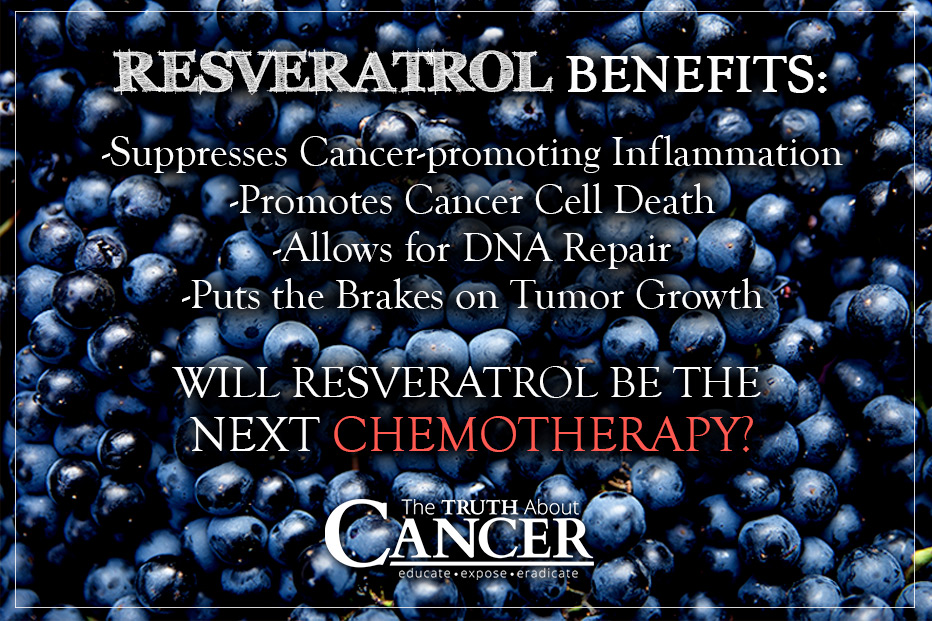6 Ways Resveratrol Supplements Help Prevent Cancer
Resveratrol
is a powerful nutrient most known for its presence in grape skins. This
micronutrient provides the human body with tools to prevent
degenerative diseases and metabolic conditions − including cancer. The health
benefits gained from resveratrol supplementation continue to amaze
researchers as they seek to understand the critical role it plays,
primarily in mitochondrial performance as well as genetic influences.
This caused researchers to dig deeper into understanding the fermented wines the French consume. What they found is that the active compound in red wine, resveratrol, has extraordinary health benefits.
Resveratrol is a powerful antioxidant classified as a polyphenol, and is the primary active compound associated with anti-aging. Polyphenols are a type of micronutrient known to help prevent illnesses such as cardiovascular disease and cancers such as colorectal cancer. The compound, also found in a variety of seeds and berries, is synthesized in plants to help protect against physical harm, infection, and disease. Interestingly, it helps to protect us as well!
Some of these benefits are comparable to caloric restriction, which is known to increase life span. But most people will avoid caloric restriction from such strategies as fasting if they are provided with an alternative way to achieve the same effects. Similar to the protective effects of calorie restriction, resveratrol is thought to offer the anti-aging protection of mitochondria. The anti-aging benefits of resveratrol can be obtained through diet and supplements.
Resveratrol is able to put a temporary hold on the cell cycle by pausing at a stage which allows for DNA repair. As a consequence, a greater number of damaged genes are fixed and fewer mistakes continue to replicate in our cells.
Research from 2003 at Harvard University provided support that cells live longer with resveratrol. The study showed that yeast cells increased in longevity by as much as 70%. Further testing on roundworms and fruit flies yielded similar results. This made resveratrol the first compound to have anti-aging benefits amongst different species. An Italian scientist later researched the effect of resveratrol supplementation on fish in 2006 and found an increased longevity by more than 50%.
For instance, cancer cells are known to have dysfunctional mitochondrial function. While normal cells derive energy from oxidative phosphorylation, cancer cells cannot. Cancer cells must rely on anaerobic glycolysis for energy production. Addressing the mitochondria which drives the energy production of the cell is key to halt tumor growth and encourage cancer cell death.
Present in three different forms, nitric oxide is found in our bodies as eNOS (iendothelial nitric oxide), iNOS (inducible nitric oxide) and nNOS (neuronal nitric oxide). Both eNOS and nNOS activity helps regulate the health of the brain and cardiovascular system while also ensuring suppressed iNOS levels. This healthy signaling pathway allows for proper blood flow to the brain through arteries and blood vessels.
However, chronic inflammatory stress increases iNOS signaling and counteracts the activity of eNOS and nNOS signaling. This improper cycle pattern can lead to hypertension, cardiovascular concerns, and neurodegenerative diseases.
Resveratrol impacts this system by inhibiting damage caused by stress, and promotes a normal and healthy nitric oxide cycle. Resveratrol results in improved endothelial performance and blood flow. Resveratrol is linked to the anti-inflammatory benefits associated with reduced risk of heart disease and neurodegenerative diseases such as Alzheimer’s and Parkinson’s disease.
Resveratrol acts on NF-KB by inhibiting its activity as well as allowing for the normal processes of the immune system to trigger cell cell death (apoptosis). The effects of resveratrol to promote apoptosis in cancer cells is so effective that researchers are analyzing the role it may play as a chemotherapeutic agent.
Resveratrol has been shown to stop this pathway and prevent breast cancer. Evidence from other studies provides support that it may also be linked to the prevention of cancerous pathways in pancreas, skin, liver, colon, prostate, and many other cancer types.

It would take 41 glasses of red wine in order to get up to the 20 mg minimum dosages that is clinically effective. That is obviously not feasible or healthy!
Healthy individuals might consider taking a daily resveratrol supplement ranging from 20 to 100 mg. Cancer patients may seek additional dosing amounts ranging from 100 to 200 mg.
Want to be notified when other awesome interviews or articles are added? Click here for our free weekly digest. You’ll be glad you did.

What is Resveratrol?
Researchers have been intrigued for years about what has been traditionally called the French paradox. This refers to the idea that the French seem to be able to eat cheese, smoke cigarettes, and drink lots of alcohol − and still maintain good health. Researchers have spotlighted the dark, fermented wines these individuals drink on a regular basis.This caused researchers to dig deeper into understanding the fermented wines the French consume. What they found is that the active compound in red wine, resveratrol, has extraordinary health benefits.
Resveratrol is a powerful antioxidant classified as a polyphenol, and is the primary active compound associated with anti-aging. Polyphenols are a type of micronutrient known to help prevent illnesses such as cardiovascular disease and cancers such as colorectal cancer. The compound, also found in a variety of seeds and berries, is synthesized in plants to help protect against physical harm, infection, and disease. Interestingly, it helps to protect us as well!
6 Ways Resveratrol Supplements Benefit Your Health
Resveratrol influences gene expression and has shown to provide anti-aging benefits. Mitochondrial oxidative stress and consequential free radical reactions contribute to the advanced aging of cells. Conversely, longevity is associated with resistance to oxidative stress.Some of these benefits are comparable to caloric restriction, which is known to increase life span. But most people will avoid caloric restriction from such strategies as fasting if they are provided with an alternative way to achieve the same effects. Similar to the protective effects of calorie restriction, resveratrol is thought to offer the anti-aging protection of mitochondria. The anti-aging benefits of resveratrol can be obtained through diet and supplements.
Resveratrol is able to put a temporary hold on the cell cycle by pausing at a stage which allows for DNA repair. As a consequence, a greater number of damaged genes are fixed and fewer mistakes continue to replicate in our cells.
Research from 2003 at Harvard University provided support that cells live longer with resveratrol. The study showed that yeast cells increased in longevity by as much as 70%. Further testing on roundworms and fruit flies yielded similar results. This made resveratrol the first compound to have anti-aging benefits amongst different species. An Italian scientist later researched the effect of resveratrol supplementation on fish in 2006 and found an increased longevity by more than 50%.
Resveratrol Stimulates Mitochondrial Activity
For instance, cancer cells are known to have dysfunctional mitochondrial function. While normal cells derive energy from oxidative phosphorylation, cancer cells cannot. Cancer cells must rely on anaerobic glycolysis for energy production. Addressing the mitochondria which drives the energy production of the cell is key to halt tumor growth and encourage cancer cell death.
Resveratrol Stabilizes Blood Sugar
Resveratrol Decreases Systemic Inflammation
Present in three different forms, nitric oxide is found in our bodies as eNOS (iendothelial nitric oxide), iNOS (inducible nitric oxide) and nNOS (neuronal nitric oxide). Both eNOS and nNOS activity helps regulate the health of the brain and cardiovascular system while also ensuring suppressed iNOS levels. This healthy signaling pathway allows for proper blood flow to the brain through arteries and blood vessels.
However, chronic inflammatory stress increases iNOS signaling and counteracts the activity of eNOS and nNOS signaling. This improper cycle pattern can lead to hypertension, cardiovascular concerns, and neurodegenerative diseases.
Resveratrol impacts this system by inhibiting damage caused by stress, and promotes a normal and healthy nitric oxide cycle. Resveratrol results in improved endothelial performance and blood flow. Resveratrol is linked to the anti-inflammatory benefits associated with reduced risk of heart disease and neurodegenerative diseases such as Alzheimer’s and Parkinson’s disease.
Resveratrol Promotes Cell Death in Cancer Cells
Resveratrol acts on NF-KB by inhibiting its activity as well as allowing for the normal processes of the immune system to trigger cell cell death (apoptosis). The effects of resveratrol to promote apoptosis in cancer cells is so effective that researchers are analyzing the role it may play as a chemotherapeutic agent.
Resveratrol Suppresses Cancer Pathways
Resveratrol has been shown to stop this pathway and prevent breast cancer. Evidence from other studies provides support that it may also be linked to the prevention of cancerous pathways in pancreas, skin, liver, colon, prostate, and many other cancer types.

Consider Resveratrol Supplementation
Many people think they can get enough resveratrol from drinking wine or eating grapes. Although these do have small amounts, it is not even close to the amount needed to achieve the clinically studied levels.It would take 41 glasses of red wine in order to get up to the 20 mg minimum dosages that is clinically effective. That is obviously not feasible or healthy!
Healthy individuals might consider taking a daily resveratrol supplement ranging from 20 to 100 mg. Cancer patients may seek additional dosing amounts ranging from 100 to 200 mg.
Want to be notified when other awesome interviews or articles are added? Click here for our free weekly digest. You’ll be glad you did.

Article Summary
- Resveratrol is a powerful nutrient most known for its presence in grape skins. It is a powerful antioxidant classified as a polyphenol, and is the primary active compound associated with anti-aging.
- The compound, also found in a variety of seeds and berries, is synthesized in plants to help protect against physical harm, infection, and disease. It also helps to protect us!
- Here are 6 ways that resveratrol may help to prevent cancer:
- Resveratrol influences gene expression and has shown to provide anti-aging benefits
- It stimulates mitochondrial activity and reduces inflammatory stress on mitochondria
- It helps to stabilize blood sugar
- It decreases systemic inflammation
- Promotes cell death in cancer cells
- It has been shown to suppress cancer cell pathways
- It is not possible to receive clinical dosages of resveratrol from drinking wine or eating grapes. For example, it would take 41 glasses of red wine per day in order to get up to the 20 mg minimum dosage.
- Healthy individuals might consider taking a daily resveratrol supplement ranging from 20 to 100 mg. Cancer patients may seek additional dosing amounts ranging from 100 to 200 mg.

No comments:
Post a Comment